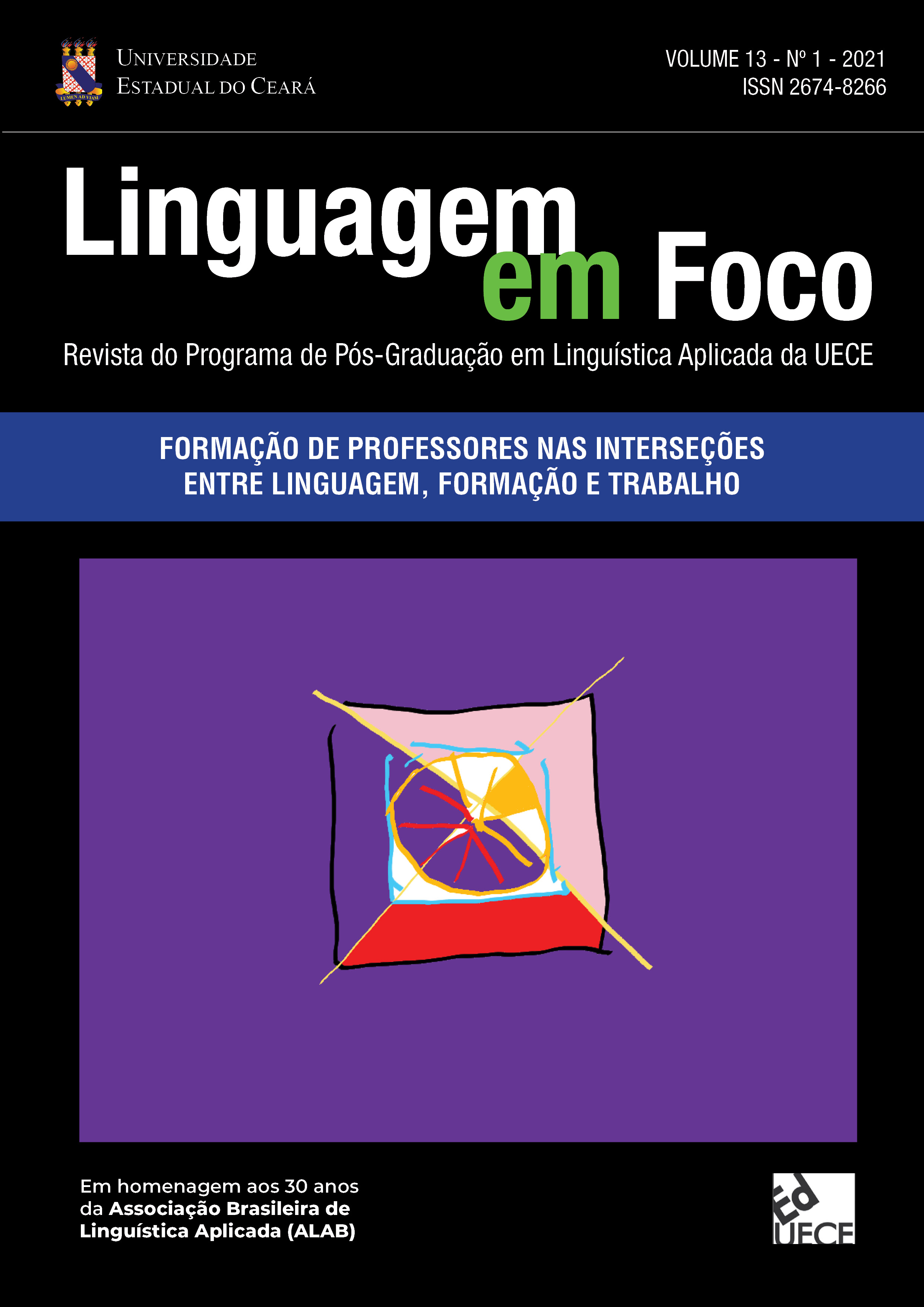Supervised curricular internship in the Portuguese Language in a remote teaching scenario
DOI:
https://doi.org/10.46230/2674-8266-13-4867Keywords:
Portuguese Language, Supervised Internship, Emergency Remote TeachingAbstract
The article describes and analyzes the activities developed during the Supervised Curricular Internship of Portuguese Language in High School, in the context of the pandemic, experienced by an academic from the Distance Letras course at State University of Maringá (UEM) in 2020. The text presents as theoretical foundations the DCE (PARANÁ, 2008), OCEM (BRASIL, 2006), BNCC (BRASIL, 2017), and the conceptions of Shulman (1987), Peres (2012), Behar (2020), Rojo and Moura (2012), among others. As a result of the experience, the work provided reflections on different faces of the teaching and learning process at school, highlighting the didactic mediation by Emergency Remote Teaching (ERE), as well as the difficulties and limitations of acting in this format, confirming the need for knowledge specific and appropriate technological resources, in addition to initial training that allows teachers to work in a context of continuous transformation.
Downloads
References
BAKHTIN, Mikhail. Estética da criação verbal.Tradução Maria E. Galvão e revisão Marina Appenzeller. 3. ed. São Paulo: Martins Fontes, 2003.
BEHAR, PatriciaAlejandra.O Ensino Remoto Emergencial e a Educação a DistânciaUFRGS.6 jul. 2020. Disponível em: https://www.ufrgs.br/coronavirus/base/artigo-o-ensino-remoto-emergencial-e-a-educacao-a-distancia/. Acesso em: 23 nov. 2020.
BRASIL, Ministério da Educação. Base Nacional Curricular Comum: versão final. Secretaria da Educação Fundamental. Brasília, 2017. Disponível em: http://basenacionalcomum.mec.gov.br/images/BNCC_EI_EF_110518_versaofinal_site.pdf. Acesso em: 16 set. 2020.
BRASIL, Portaria nº 544, de 16 jun. 2020. Diário Oficial da União. Disponível em: https://www.in.gov.br/en/web/dou/-/portaria-n-544-de-16-de-junho-de-2020-261924872. Acesso em: 23 dez. 2020.
BRASIL, Secretaria de Educação Básica. Orientações Curriculares para o Ensino Médio - Linguagens, códigos e suas tecnologias. v. 1. Brasília: Ministério da Educação, 2006. Disponível em: http://portal.mec.gov.br/seb/arquivos/pdf/book_volume_01_internet.pdf. Acesso em: 16 set. 2020.
BRASIL, Secretaria de Educação Fundamental. Parâmetros Curriculares Nacionais: Língua Portuguesa. Brasília. Secretaria de Educação Fundamental, 1998.
CECILIO, Sandra Regina. Ensino de língua portuguesa: análise linguística. In: Aparecida de Fatima Peres (Org.). Saberes docentes e práticas de ensino de língua portuguesa: leitura, escrita, análise linguística e gramática. Maringá: Eduem, 2012. p.79-102.
GAYDECZKA, Beatriz; KARWOSKI, Acir Mário. Pedagogia dos multiletramentos e desafios para uso das novas tecnologias digitais em sala de aula no ensino de língua portuguesa. Linguagem & Ensino, Pelotas, v.18, n.1, p. 151-174, jan./jun. 2015. Disponível em: https://periodicos.ufpel.edu.br/ojs2/index.php/rle/article/view/15301. Acesso em: 15 mar.2020.
KLEIMAN, Angela. O que é letramento? Modelos de letramento e as práticas de alfabetização na escola. In: KLEIMAN, Angela. (Org.).Os significados do letramento. Campinas: Mercado de Letras, 2008. p. 15-64.
MOREIRA, José António Marques; HENRIQUES, Susana; BARROS, Daniela. Transitando de um ensino remoto emergencial para uma educação digital em rede, em tempos de pandemia. Dialogia, São Paulo, n. 34, p. 351-364, jan./abr. 2020.Disponível em: https://periodicos.uninove.br/dialogia/article/view/17123. Acesso em: 14 ago. 2020.
PARANÁ. Secretaria de Estado da Educação. Diretrizes Curriculares de Língua Portuguesa para os anos finais do Ensino Fundamental e Ensino Médio. Curitiba/PR: SEED, 2008.
PERES, Aparecida de Fatima. Afinal, o que é preciso saber para ser professor? In: Aparecida de Fatima Peres (Org.). Saberes docentes e práticas de ensino de língua portuguesa: leitura, escrita, análise linguística e gramática. Maringá: Eduem, 2012. p.13-24.
PINHEIRO, Wagner. Aula 3: como colocar a aula no Youtube e disponibilizar para seus alunos. Física Club.Disponível em: https://www.youtube.com/watch?v=BrhPQs9zPlg. Acesso em: 23 dez. 2020.
RITTER, Lilian Cristina Buzato. Uma proposta pedagógica de leitura na perspectiva dialógica. In: Aparecida de Fatima Peres (Org.). Saberes docentes e práticas de ensino de língua portuguesa: leitura, escrita, análise linguística e gramática. Maringá: Eduem, 2012. p.37-52.
ROJO, Roxane Helena Rodrigues; MOURA, Eduardo (Org.). Multiletramentos na escola. São Paulo: Parábola Editorial, 2012.
SHULMAN, Lee S. Knowledge and teaching: foundations of the New Reform. Harvard EducationalReview, Cambridge, n. 1, v. 57, p. 1-22, Febr. 1987.
VIANNA, Carolina Assis Dias; SITO, Luanda; VALSECHI, Marília Curado; PEREIRA, Sílvia Letícia Matievicz. Do Letramento aos letramentos: desafios na aproximação entre letramento acadêmico e letramento do professor. In: KLEIMAN, Angela B.; ASSIS, Juliana A. (Org.). Significados e ressignificações do letramento: desdobramento de uma perspectiva sociocultural sobre escrita. Campinas: Mercado de Letras, 2016.
Published
How to Cite
Issue
Section
License
Copyright (c) 1969 Patrícia Cardoso Batista, Nilza Pereira Crepaldi, Annie Rose dos Santos

This work is licensed under a Creative Commons Attribution 4.0 International License.
Authors who publish in Linguagem em Foco Scientific Journal agree to the following terms:
- Authors retain the copyright and grant the journal the right of first publication. The articles are simultaneously licensed under the Creative Commons Attribution License which allows sharing the work with an acknowledgement of its authorship and initial publication in this journal.
- The concepts issued in signed articles are the absolute and exclusive responsibility of their authors. Therefore, we request a Statement of Copyright, which must be submitted with the manuscript as a Supplementary Document.
- Authors are authorized to make the version of the text published in Linguagem em Foco Scientific Journal available in institutional repositories or other academic work distribution platforms (ex. ResearchGate, Academia.edu).





























